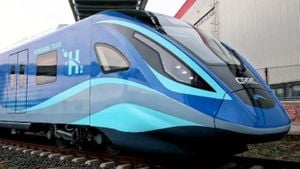Friedrich Merz's centre-right Christian Democratic Union (CDU) has emerged victorious, securing the highest proportion of votes in Sunday’s election, with celebrations likely overshadowed by hurdles in forming a new government. Preliminary projections indicate Merz’s CDU and its ally, the Christian Social Union (CSU), will gain 208 seats (28.5%) in the Bundestag. This significant victory, nevertheless, places Merz at the crossroads of political challenges as coalition government negotiations draw near.
While the CDU's win marks an upturn from previous electoral lows, the Social Democratic Party (SPD), led by outgoing Chancellor Olaf Scholz, has suffered its worst defeat since World War II, capturing just 121 seats (16.5%). The far-right Alternative for Germany (AfD) party, on the other hand, has recorded its best-ever result with 151 seats (20.7%), stirring alarming concerns about the German electorate's shift to the right.
Reflecting on his success, Merz expressed gratitude to voters, stating, "The world out there is not waiting for us and for lengthy negotiations," hinting at the urgency of forming a stable government. Yet, his electoral strategy may complicate this endeavor. By adopting anti-migrant rhetoric similar to the AfD, critics argue Merz has inadvertently strengthened the far-right party's standing rather than siphoning votes.
Historical patterns suggest challenges lie ahead for Merz. His party must tread carefully to avoid collaboration with the AfD, which is still considered taboo within much of Germany’s political spectrum. During the campaign, Merz labelled leftists and Green party members as “crazies,” which could hinder potential partnerships, especially as the SPD appears reluctant to join forces with the CDU after its run-in with the far-right.
The possibility of building a grand coalition between the CDU and SPD looms large, particularly as the two parties could command enough seats to govern effectively, yet significant policy differences on the economy and Ukraine may cause friction. Scholz has already ruled out serving in any Merz cabinet, leaving the operational dynamics of such collaboration uncertain.
Beyond domestic issues, Merz faces pivotal challenges internationally. He has voiced the centrality of independence from the current US leadership’s influence, framing the task of strengthening Europe as key to solidifying its defense strategies. He declared, "If we want to be taken seriously as equals, we as Europeans must put ourselves in a position to take responsibility for our own security." This statement reflects his intentions of shifting Germany’s foreign policy stance significantly, especially toward NATO and relations with Europe’s immediate concerns.
With strong sentiments toward providing increased military assistance to Ukraine, Merz has committed to addressing Germany’s position as one of the largest suppliers of aid, promising to bolster this support by potentially sending advanced weaponry. Previous chancellor Scholz has been criticized for his hesitant approach to military engagement, presenting Merz with the opportunity to set himself apart by taking on bolder initiatives.
The electoral aftermath will likely be closely monitored as Merz’s CDU attempts to navigate coalition negotiations, which could extend until Easter. The CDU’s relationship with the SPD, marked by mutual distrust, remains fraught with potential pitfalls. Alice Weidel, co-leader of the AfD, has controversially reached out for cooperative discussions, declaring, "a historic success for us – our best result ever," emphasizing the growing potency of far-right politics within German society.
Friedrich Merz’s promising rise has been shadowed by the enduring influence of Angela Merkel's governance. Critics highlight his electoral performance as historically lower than his predecessor's, raising concerns about his capability to tackle the multitude of pressing issues plaguing the nation. He’s tasked with reinvigorate trust within the political centre and bridging divides exacerbated by extremism.
Germany’s historical struggle with far-right ideologies presents Merz with significant obstacles; any governmental shortfalls could embolden the AfD, potentially tilting future elections. Analysts caution the CDU to resolve existing challenges effectively, restoring faith within liberal democracy and presenting unified fronts against regression.
Germany stands at a crossroads, yearning for leadership amid unprecedented challenges. Merz may articulate plans for progress, yet the feasibility of such actions hinges on his ability to unify disparate coalition partners and navigate electoral pressures from the right. With Europe watching closely, the global expectations placed on Merz’s administration could define not just the future of Germany but the broader EU's stance within geopolitical dialogues.



